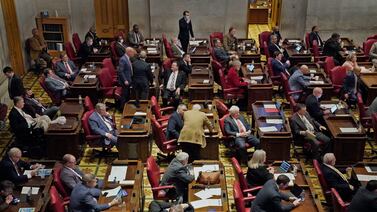
A tax on nicotine products on this November’s ballot could deliver the dedicated funding source that Colorado preschool advocates have sought for years to make sure more children have access to early learning.
Supporters also hope Proposition EE will make a dent in an epidemic of teen vaping. But a “sin tax” may be shaky ground on which to expand essential government services.
Proposition EE would more than triple state taxes on cigarettes by 2027 to $2.64 a pack and also impose new taxes and fees on smokeless tobacco and vaping products popular among youth. Colorado has the nation’s highest rate of teen vaping, with the low cost being one factor. The measure also would set a minimum price for cigarettes, a provision that already has provoked a lawsuit.
The tax revenue would fund free preschool to 4-year-olds across the state, among other efforts. Providing universal preschool was a key campaign promise of Gov. Jared Polis when he ran for office in 2018, but finding the money for it has proved challenging.
The sin tax aims to generate revenue — perhaps as much as $276 million a year — and also to discourage harmful behaviors by making them too costly to partake. Its double-edged sword is controversial: If the tax succeeds in changing behavior, people spend less money on the sin — and generate less money for the government.
What’s in it for children?
Colorado falls below the national average in providing quality preschool education to families. The state enrolls only 23% of its 4-year-olds and 9% of its 3-year-olds into public pre-K programs, according to the National Institute for Early Education Research.
If the measure passes, all children will have access to at least 10 hours of preschool each week in the year prior to entering kindergarten. Children in families with low incomes or who face other barriers to school readiness will have access to additional preschool programming to better meet their needs beginning in the fall of 2023.
“This would make Colorado unique in the country in that we would offer a state preschool program that would provide something for everyone, but provide the greatest benefit to those who face the greatest barriers to opportunity,” said Bill Jaeger, vice president for early childhood and policy initiatives for the Colorado Children’s Campaign.
Currently, the Colorado Preschool Program — which serves low-income families and those with learning challenges or other risk factors — only has the funding to serve 40% of eligible children.
Two years ago, the latest data available, Colorado met only four of 10 minimum standards for high-quality preschool education, according to the National Institute for Early Education Research. Enrollment grew by fewer than 500 children from the previous school year. The state ranks 28th nationwide in access for 4-year-olds, 12th in access for 3-year-olds, and 39th in state spending per pupil.
With additional revenue, Colorado could improve its quality preschool education rankings.
“As enrollment expands, then [Colorado] could move up a few rankings quickly, and if it moves toward universal, into the top 10,” said Steven Barnett, NIEER founder and senior co-director.
However, the most reliable income source for preschool education is one that taps into property taxes, he said, but with provisions to make it more progressive.
Research shows children who attend high-quality educational programs are more likely to graduate from high school, have higher earning potential as adults, and are less likely to commit crimes or become teenage parents. And in Colorado, white children are more likely to be enrolled in quality preschool programs than children of color, a gap that additional funding could help close.
Jaeger called Proposition EE “a wise investment,” leaning on the numerous findings that prove preschool works in the long run.
“For every $1 invested in quality preschool, between $8 and $16 is avoided in societal cost and between $2 and $3 is returned in increased per capita earnings and jobs for state residents,” Jaeger said.
Voters rejected an increase in the cigarette tax in 2016, as they have rejected most statewide taxes on the ballot. Proponents hope that the impact of the coronavirus pandemic coupled with imposing a new tax on vaping products and fuel — which are not currently taxed in the state — give the measure a better chance of passing this year.
Opponents: Now is not a good time
Opponents are leery of the measure because it first directs its tax revenue to the general fund and preschool funding would be delayed for several years. The group calls the proposition a “blank check” for unidentified projects. While the proposition lays out how the money would be spent, future legislators could make changes.
They also contend that a pandemic-induced recession is not the best time to impose a tax on the most vulnerable populations.
“As our economy recovers from COVID 19, now is not the time to raise taxes on any Colorado voter,” wrote A Bad Deal for Colorado, a committee funded by discount cigarette makers opposed to the measure, in a statement. “Proposition EE taxes approximately 14% of Coloradans, around 80% of whom earn less than $40,000 per year.”
By the numbers
If approved, the measure would increase the current $0.84 tax on a single pack of cigarettes gradually over a seven-year period until it reaches $2.64 by 2027. That would bring Colorado from 39th in the nation to 13th, based on 2020 tax rates maintained by the Campaign for Tobacco-Free Kids.
The measure also would set a minimum price of $7 per pack starting in January, growing to $7.50 per pack by 2024.
Discount cigarette makers already have filed a lawsuit challenging the minimum sales price provision. Altria, the owner of Marlboro cigarettes, helped write the initiative and is not opposing it, unlike previous years, the Colorado Sun reported.
For smokeless products such as chewing tobacco, cigars, and snuff, the current 40% tax would incrementally increase to 62% by 2027. The measure would impose a minimum tax of $1.48 per 1.2-ounce container starting in January that would increase to $2.26 by 2027.
Also beginning in January, vape products including vaping devices, fuel, and e-cigarettes would be taxed at 30%, increasing over time until it reaches 62% by the summer of 2027.
The measure would provide an estimated $25 million to $35 million a year for Colorado’s rural schools for the first several years, replacing dedicated funding the legislature could no longer afford after the coronavirus downturn.
Starting in 2024, the measure calls for 73% of revenue generated by the tax to be put into a newly created fund for preschool programs, with the rest remaining in the general fund for other programs.
Analysts estimate that, in total, Proposition EE would generate about $178 million by 2022-23 and as much as $276 million a year by 2027-28.
A Brighter, Healthier Future for Colorado’s Kids, a group supporting the measure, estimates the proposition will generate $2 billion for universal preschool over 10 years and $110 million for tobacco-vape cessation and other public health programs.
That all depends, though, on whether Coloradans keep vaping and smoking at the same rates.








